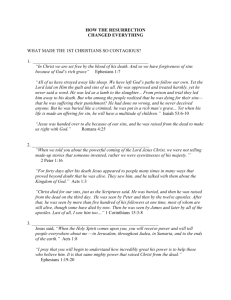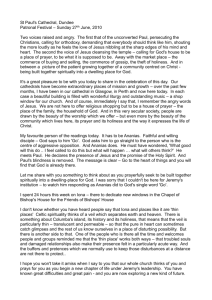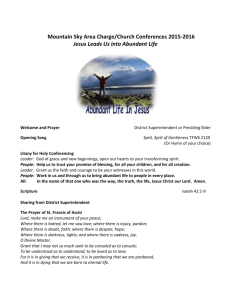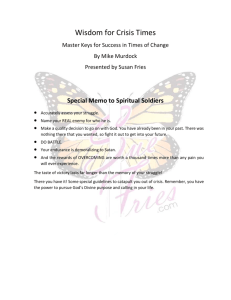1 Conflict Intro: - We`re down to our last lesson in our series on the
advertisement
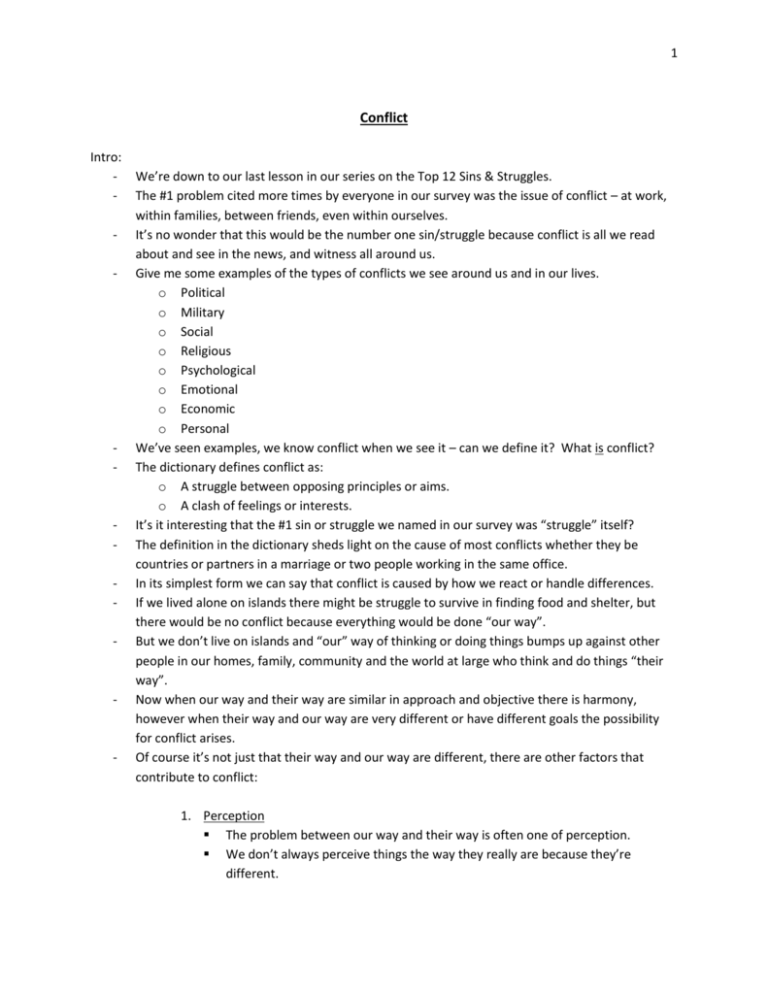
1 Conflict Intro: - - - - - We’re down to our last lesson in our series on the Top 12 Sins & Struggles. The #1 problem cited more times by everyone in our survey was the issue of conflict – at work, within families, between friends, even within ourselves. It’s no wonder that this would be the number one sin/struggle because conflict is all we read about and see in the news, and witness all around us. Give me some examples of the types of conflicts we see around us and in our lives. o Political o Military o Social o Religious o Psychological o Emotional o Economic o Personal We’ve seen examples, we know conflict when we see it – can we define it? What is conflict? The dictionary defines conflict as: o A struggle between opposing principles or aims. o A clash of feelings or interests. It’s it interesting that the #1 sin or struggle we named in our survey was “struggle” itself? The definition in the dictionary sheds light on the cause of most conflicts whether they be countries or partners in a marriage or two people working in the same office. In its simplest form we can say that conflict is caused by how we react or handle differences. If we lived alone on islands there might be struggle to survive in finding food and shelter, but there would be no conflict because everything would be done “our way”. But we don’t live on islands and “our” way of thinking or doing things bumps up against other people in our homes, family, community and the world at large who think and do things “their way”. Now when our way and their way are similar in approach and objective there is harmony, however when their way and our way are very different or have different goals the possibility for conflict arises. Of course it’s not just that their way and our way are different, there are other factors that contribute to conflict: 1. Perception The problem between our way and their way is often one of perception. We don’t always perceive things the way they really are because they’re different. 2 This happens because we don’t take the time to listen or we don’t make an effort to understand. Sometimes we’ve been given wrong information so our opinion has been prejudiced. So we react negatively to “their way” because of our perception that their way is: Not good, weak, not true, etc. Dangerous Against our way somehow Will not achieve the goal *In the end, if our perception of their way is negative (for whatever reason) we will enter into a conflict to replace their way with our way. ...another factor that contributes to conflict... 2. Pride We think “our way” in whatever context is always the “best way”. So long as everyone else goes along with our way there is no conflict. There are many reasons for this type of attitude but the most common one is a false estimate of our true worth. Some people suffer from low self-esteem and falsely think they are not worthy – others suffer from overly high esteem and think they are more than worthy and this leads to conflict. Pride over culture leads to war and mass murder. Pride for “our way” destroys couples in marriage, partners in business, friends at school, brethren in the church. *When we assume that our way is best we will always be in conflict, it will be a constant experience in our lives. ...one other fact... 3. Politics Now when I say politics I don’t simply mean government (Liberals vs. The NDP / Bloc PQ, etc.). I mean the games people play in order to get “their way”. Governments play politics so they can hold on to power in order to exercise “their way” in running the country. I'm referring to strategies, methods that groups and individuals use in order to impose their will. 3 - - - Some are brutal like in many countries where the government uses force to impose their will on the people. Some are subtle like a young child manipulating one parent against another in order to get a new toy. And so politics (the way we get our way) also has an effect on the intensity of conflict we will experience. Those brutal requires often give rise to resistance movements and civil wars as one group pushes back against another = conflict. A domineering boss who insists on her way or the highway may foster employees who become passive aggressive in their behaviour in order to block her plans out of spite = conflict. The husband who thinks his opinion on everything is correct may create a wife who challenges him on everything just to prove him wrong = conflict. And so the list goes on and on in the various ways conflict can arise based on how we impose “our way” over “their way”. Our politics are formed by our ethics (our sense of what is right and wrong) and so how we impose “our way” will be guided by what we believe is right and wrong. *This is true for governments as well as married couples, people at work, family, friends – how and when we choose to get “our way” will play a large factor in how much conflict we experience. I. The Bible & Conflict Of course the subject of conflict is a very wide and complicated one. Trying to cover it in a ½ hr. Bible study is not possible – however we can make some general observations as to the causes of conflict. o Perception – my way is better o Pride – my way is best o Politics – my way by any means. In the same way I think we can make some suggestions from the Bible as to how we can avoid or at least lower the frequency and intensity of the conflict in our lives. 1. Examine “our way” Be honest about yourself first – Rom. 12:4 Let’s face it, the reason for most of the conflicts in our lives is that we are not able to get “our way” somehow. James 4:1-3 When we don’t get “our way” in our personal relationships, jobs, family, etc. we begin to examine the person who is blocking our way or the situation blocking our way. 4 - - - - - - Conflicts are rarely resolved without a change of some kind, but they persist because we always expect the change to come from someone else! o We want them to change “their way” in order to accommodate “our way” because our way is Right, better, more comfortable, or just – our way. God tells us through Paul to be honest in how you evaluate yourself (includes “your way”). o Don’t measure yourself by yourself, but rather by “the” faith God has given you. o The “faith” is the body of teaching provided by God in His word. o In other words, Christians don’t have “their way”, they have “God’s way” of dealing with things dictated by His word. Paul is saying measure “your way” against “His way” to be sure they are compatible. A person’s estimate of himself is too high if he insists that “his own way” is better than “God’s way” and this attitude smacks of pride and leads to conflict. Usually conflict is avoided or greatly reduced when we seek to follow “God’s way” in our dealing with others. Examples of God’s way replacing our way when in conflict situations include but certainly not limited to: o Prov. 15:1 – “A gentle answer deflects anger but harsh words make tempers flare.” Instead of – Fight fire with fire. o Rom. 12:10 – “Love each other with genuine affection and take delight in honouring one another.” Instead of – My way or the highway. o Any other examples you can think of? And so we need to always be aware of what we are contributing to the conflict we are experiencing: o Is it our pride, incorrect, prejudice or approach that may be pouring gasoline to the fire? o Am I dealing with their way using God’s way or my way? o How much of this conflict am I responsible for? *And honest (meaning a judgment based on God’s word) estimate of ourselves is always the beginning of the end of conflict. 2. Expect Conflict There will always be conflict. As Christians we need to minimize what we do to create, intensify, or prolong conflict but we also need to be realistic and realize that we cannot eliminate conflict. o We’ve not been called by God to stop all conflict in the world. This isn’t the purpose of Christianity. Jesus said that there would always be conflict of some kind in the world – Mt. 24:4-8 (READ). He even warned His disciples that because of their faith in Him they would be drawn into conflict – Mt. 10:34-36 (READ). The only conflict we engage in is the one that involves disbelief and belief in Jesus Christ. 5 o - - - - - - - - This conflict/struggle will always be present within ourselves as we strive to live by the spirit and not by the flesh. o And we will be constantly challenged to stand up for the faith in the presence of a disbelieving world. So there is always conflict of some kind – but Christians focus on the one involved in establishing the spiritual kingdom and try to minimize others. Obviously conflict in the world is largely due to sin of some kind and in the world there is great effort to resolve or win conflicts using a variety of manmade approaches such as force, social activism, diplomacy, mediation, etc. As Christians we don’t deny that these conflicts do and will continue to exist, and that these methods or resolutions work to a certain extent. However, we also believe that the ultimate solution to conflict whether it be between two countries or a mother and her daughter, is peace through faith and submission to Jesus Christ by both parties. This may seem foolish to the world, but it always succeeds when attempted. *So we accept that there will always be conflict but we choose which conflict to struggle in and how we will fight (the sword of the spirit, Eph 6:10-17 – READ). ...dealing with conflict... 1. Examine “our way” 2. Expect conflict 3. Engage God in Prayer I know that going to God in prayer is a pretty standard answer for all of life’s issues but it is especially important in times of conflict. If there is ever a time for fervent prayer it is when we are in conflict. Usually the conflict is painful, or threatening, creating all kinds of upheaval and change in our lives. o Can’t sleep, think straight, lose our sense of humor, joy, ability to focus. Many times conflict is simply a diversion by Satan to prepare us for a fall of some kind. o IE – Cain was in conflict with Abel over the appropriateness of his sacrifice and his anger and resentment led him to kill his brother. o Paul and Barnabas were in conflict over Mark’s conduct during their first missionary journey and their conflict could have threatened the future of Paul’s important mission work. When we are in conflict we are vulnerable so we must take extra care and time to lay our case, our thoughts, our frustrations, our pain before God in prayer. o And see “His way” forward, His solution, insight to guide us. Many times when we’re in conflict we’ll pray about things but neglect to do the second and more difficult part of prayer – wait for an answer, wait for God to act. o “Be still and know that I am God.” Ps. 46:10 The word tells us that God will direct us, teach us, show us the right way. 6 - o “Show me the right path O Lord, point out the road for me to follow” Ps. 25:4. When we are in conflict, too often we try to resolve it ourselves without waiting for God to guide our actions or act on our behalf. Whether it’s a conflict with a friend, a conflict inwardly, a conflict in living the right way as a Christian, or conflicts with our spouse – engage the Lord in prayer and wait for His leading out of conflict. *God knows the root and solution to all conflicts in our lives – prayer helps us not only see what God sees, it also helps us to do what is necessary to reduce the conflict and have peace, not the peace that the world offers with truces and treaties – but the peace that can only come through Jesus Christ. Summary - We’re in conflict with God and each other because of sin and Jesus makes peace with God on our behalf through His death on the cross. Each of us can now have peace with God through the forgiveness of our sins when we believe in Christ, repent of our sins, and are baptized in His name. Once we have this blessed peace with God we have the spirit`s power within us to be at peace with all men. *As we close out this series on sins and struggles let me encourage everyone here who has not yet done so to give yourselves to God in the baptism of Christ – so you can have the victory over all your sins and struggles forever.


